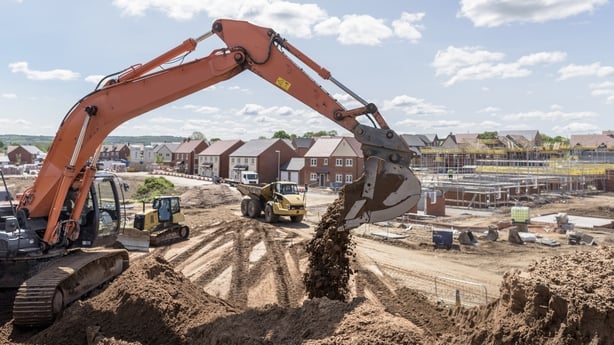The Commission on Housing is expected to recommend a referendum on housing should be held later this year.
Members of the Commission are likely to present Minister for Housing Darragh O'Brien with a proposed wording in the coming weeks.
The Commission on Housing was set up in 2021 to look at a range of policy issues around delivery of housing projects and quality of supply. It was also tasked with advising the Government on a potential referendum.
Dr Jennifer Kavanagh, a Law lecturer in South East Technological University and an expert in constitutional law, thinks any referendum should deal with issues which are perceived to be a barrier to delivery.
"When it comes to interpretation of the law and things like bringing in protections for renters or speeding up planning processes it may help to hold referendum, but it is only one part, it is only the constitutional aspects and the problem is much broader than that," she says.
"A constitutional referendum may help rebalance some of the issues but it's not going to get houses built," she adds.
Sources in the Department of Housing have confirmed that work is at an advanced stage on a proposed wording. The final text which is likely to centre around a constitutional right to housing will be presented to the Minister O'Brien later this month or in early February.

People Before Profit TD Richard Boyd Barrett has long campaigned for a referendum on this issue. He argues that there should be a constitutional right to affordable housing.
"That means ensuring there are no legal obstacles to rent controls, to dealing with land speculation, with vacant property being sat on by investors, and protecting tenants' rights against unfair treatment by landlords," he says.
He argues that if we are to put the right to housing in the Constitution, it also has to be matched by investment and resources and "radical policy measures to actually deal with a catastrophic housing and homelessness crisis".
The Commission canvassed a range of views from international experts, homeless campaigners and from members of the public and more than 2,000 submissions were received.
We need your consent to load this rte-player contentWe use rte-player to manage extra content that can set cookies on your device and collect data about your activity. Please review their details and accept them to load the content.Manage Preferences
Mike Allen, Director of Advocacy with Focus Ireland, says "for years the Minister has been saying there are a whole range of things that he is unable to do in terms of derelict land and vacant property because of the constitution. We need it to be changed to deal with those types of issues".
If the wording put forward by the Commission is accepted by Government, the vote could take place in September or October this year.
Holding a referendum is not cheap. Figures published by the Department of Finance show the most expensive referendum in the State was the Lisbon Treaty vote in 2008 which cost over €22m.

The 2015 Marriage Equality Referendum which was held on the same day as a poll to lower the age of eligibility to run in presidential elections cost €15m. That is not including the cost of the campaign.
Mr Allen says if we are going to hold a referendum on housing it has to be a meaningful one and the wording will be key.
"We don't need a referendum that won't actually change things, it can't be just going through the motions. It needs to actually change the way that we approach housing and the delivery of homes in this country.
"We should have a very different prospect after the referendum is passed," he says.
Housing is a key priority for this Government and delivering actual homes will be the real test rather than any referendum result, he says.
If the Government proceeds with a housing referendum, it is likely a second vote to retain Irish Water in public ownership will also take place.

A separate unit in the Department of Housing has been working on advancing this issue and the Government could avail of the opportunity to hold both on the same day.
Dr Kavanagh says these are the two main issues exercising the public. "People can see the problems that are there in housing and in water and they are probably the issues that should be prioritised," she said.
The referendum on water will pave the way for 3,500 local authority staff to transfer to Irish Water.
Mr Boyd Barrett says People Before Profit was concerned at "the back door privatisation of water services and the loss of decent jobs for those who work in this area.
He says he would welcome a referendum on water because it "guarantees that water remains in public ownership and that guarantees decent pay and conditions for workers".
Other potential referendums
In addition to housing and water, the Programme for Government also commits to holding a referendum on article 40 of the Constitution and a referendum to extend voting rights to Irish citizens outside the State.
Galway East TD Ciaran Cannon is one of those behind votingrights.ie - a group which is campaigning for the extension of the right to vote for Irish citizens living abroad. He describes the issue as a "no brainer".
"Ireland is an outlier on this. If you are a citizen, you should have a vote, just look at the recent Brazilian elections, we saw people queueing down the street in Dublin to cast their vote. Someone living in Abu Dhabi or Perth has as much a right to vote as someone living in Ballinasloe," he says.
It is not clear how many people would benefit from any extension. In 2017 the Departments of Foreign Affairs and Housing looked at the issue and concluded there is no authoritative figure on the number of citizens living outside the State.
Their report found that while the Irish diaspora, is said to be in the region of 70 million people worldwide, the number of people who would have a claim to Irish citizenship is a "mere fraction" of that figure.
They estimate there are some 1.73 million citizens who are currently resident outside the State. Adding this to the 1.9 million potential voters in Northern Ireland gives a conservative estimate of 3.6 million potential voters.
Mr Cannon argues there is an urgency to this issue if it is to be resolved before the next presidential election which is due to take place in 2025.
"Based on an enlarged electorate with an additional 3.6 million people, a lot of work will need to be done to ensure the security of the ballot ahead," he says.
Gender equality
The Citizens Assembly and the Oireachtas Committee on Gender Equality has held substantial discussions on a referendum on Gender Equality (Article 40 and 41 of the Constitution).
In December the Oireachtas Committee published a proposed wording, calling for the referendum to take place later this year.
Labour Leader Ivana Bacik who is chair of the Committee says the proposal will "remove sexist language which currently exists in Article 40 which refers exclusively to women and mothers as having a 'life' and 'duties' within the home".
She also wants more changes which will include more "gender neutral language and ensure that the role of care is recognised, valued and supported".

The proposed changes would also ensure a more inclusive definition of ‘family’ beyond the family based upon marriage.
During the committees' engagements with the then Tánaiste Leo Varadkar, he was asked about the timeframe for the holding of a referendum. He said: "Approximately a year is needed to prepare the ground, make sure we are ready for any disinformation and prepare for the campaign."
Ms Bacik believes "‘gender equality is a matter of human rights, justice, and fairness" and "it must underpin all of our interactions as a society".
"Until gender equality is achieved, our democracy will remain unfinished," she says.







